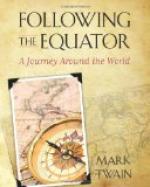In America we have no annual supreme day; no day whose approach makes the whole nation glad. We have the Fourth of July, and Christmas, and Thanksgiving. Neither of them can claim the primacy; neither of them can arouse an enthusiasm which comes near to being universal. Eight grown Americans out of ten dread the coming of the Fourth, with its pandemonium and its perils, and they rejoice when it is gone—if still alive. The approach of Christmas brings harassment and dread to many excellent people. They have to buy a cart-load of presents, and they never know what to buy to hit the various tastes; they put in three weeks of hard and anxious work, and when Christmas morning comes they are so dissatisfied with the result, and so disappointed that they want to sit down and cry. Then they give thanks that Christmas comes but once a year. The observance of Thanksgiving Day—as a function—has become general of late years. The Thankfulness is not so general. This is natural. Two-thirds of the nation have always had hard luck and a hard time during the year, and this has a calming effect upon their enthusiasm.
We have a supreme day—a sweeping and tremendous and tumultuous day, a day which commands an absolute universality of interest and excitement; but it is not annual. It comes but once in four years; therefore it cannot count as a rival of the Melbourne Cup.
In Great Britain and Ireland they have two great days—Christmas and the Queen’s birthday. But they are equally popular; there is no supremacy.
I think it must be conceded that the position of the Australasian Day is unique, solitary, unfellowed; and likely to hold that high place a long time.
The next things which interest us when we travel are, first, the people; next, the novelties; and finally the history of the places and countries visited. Novelties are rare in cities which represent the most advanced civilization of the modern day. When one is familiar with such cities in the other parts of the world he is in effect familiar with the cities of Australasia. The outside aspects will furnish little that is new. There will be new names, but the things which they represent will sometimes be found to be less new than their names. There may be shades of difference, but these can easily be too fine for detection by the incompetent eye of the passing stranger. In the larrikin he will not be able to discover a new species, but only an old one met elsewhere, and variously called loafer, rough, tough, bummer, or blatherskite, according to his geographical distribution. The larrikin differs by a shade from those others, in that he is more sociable toward the stranger than they, more kindly disposed, more hospitable, more hearty, more friendly. At least it seemed so to me, and I had opportunity to observe. In Sydney, at least. In Melbourne I had to drive to and from the lecture-theater, but in Sydney I was able to walk both ways, and did it. Every night, on my way home at ten, or a quarter past, I found the larrikin grouped in considerable force at several of the street corners, and he always gave me this pleasant salutation:




